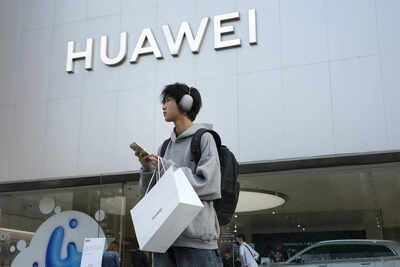ARTICLE AD BOX

FILE (AP Photo/Andy Wong, File)
Huawei Technologies new MateBook Fold relies on a 7-nanometer chip made by Semiconductor Manufacturing International Corp. (SMIC), using technology from years ago, indicating that U.S. sanctions continue to hinder China’s progress in advanced semiconductor development, Bloomberg reported, citing Canada-based consultancy TechInsights. This chip uses the same 7nm process as Huawei’s Mate 60 Pro, which surprised U.S. officials in 2023. In contrast, Taiwan Semiconductor Manufacturing Co. is set to mass-produce 2nm chips, three generations ahead, later this year.The foldable notebook-tablet hybrid, launched in May, runs on Huawei’s HarmonyOS and reflects Beijing’s push for tech self-reliance amid U.S.-led restrictions, Bloomberg noted. However, China struggles to access cutting-edge chipmaking tools, as ASML Holding NV is barred from selling advanced lithography machines to Chinese firms. TechInsights stated, “This likely means that SMIC has not yet achieved a 5nm-equivalent node that can be produced at scale,” highlighting the impact of U.S. technology controls on SMIC’s ability to compete with leading foundries.
America's China threat and fear
The US sees China as a key rival in the field of artificial intelligence. The rise of DeepSeek earlier this year sending shock waves across US technology companies and wiping billions from their valuation. In addition to efforts to prevent China from securing advanced semiconductor manufacturing equipment, Washington is blocking Chinese companies from acquiring Nvidia's high-end AI chips for training, citing national security concerns. Beijing, on its part, is now pinning its hopes on Huawei and SMIC when it comes to advanced chipmaking.
Despite Huawei’s 2023 debut of a China-made 7nm chip, progress has stalled, with U.S. export controls limiting Huawei to producing only 200,000 Ascend AI chips in 2025, according to U.S. Under Secretary of Commerce Jeffrey Kessler, Bloomberg reported. Washington views China as a rival in AI, especially after DeepSeek’s global emergence in 2025, and continues to block access to Nvidia’s high-end AI chips. Huawei’s founder Ren Zhengfei, in an interview with People’s Daily, downplayed U.S. curbs, suggesting techniques like chip stacking could mimic advanced semiconductor results.



.png)
.png)
.png)
















 7 hours ago
4
7 hours ago
4









 English (US) ·
English (US) ·